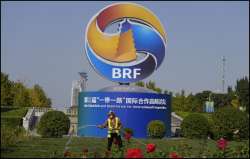India is set to boycott a summit of China's Belt and Road Initiative on Tuesday for the third consecutive time to highlight its stance on the controversial China-Pakistan Economic Corridor (CPEC) and the financial viability of Beijing's projects in other countries, according to sources.
China is hosting the Belt and Road Forum for International Cooperation (BRFIC) on Tuesday and Wednesday, as its 'debt-trap diplomacy' tactic is under fire, wherein countries who loan billions of dollars in allegedly unsustainable projects get trapped under debt traps and eventually get pushed into an economic crisis.
China has signed about 50 documents with relevant parties under the BRI platform during the past 10 years, and jointly launched the BRI Partnership on Green Development with 31 countries, Global Times quoted Chinese Foreign Ministry spokesperson Wang Wenbin.
India had not taken part in the previous two BRI conferences in 2017 and 2019 and will repeat its absence in this year's event that marks the 10th anniversary of the Chinese flagship project. India has repeatedly slammed the $60 billion CPEC that is being laid through the Pakistan-occupied Kashmir (PoK) without respecting India's sovereignty concerns.
India has also called for the BRI projects should be based on universally recognised international norms, good governance, and the rule of law, and to follow principles of openness, transparency and financial sustainability.
Sri Lanka and Russia to attend the event
According to Chinese Vice Foreign Minister Ma Zhaoxu, representatives from at least 140 countries and 30-plus international organisations, including state leaders, heads of international organisations, and ministerial officials among others will attend the BRI summit, including Russian President Vladimir Putin and his Sri Lankan counterpart Ranil Wickremesinghe.
Sri Lanka faced an enormous economic crisis last year and declared sovereign default of its loans. The country has a total foreign debt of $46.9 billion, of which 52% it owes to China, its largest lender.
Amid Sri Lanka's financial woes, India pitched around $4 billion to immediately tide over its worst economic crisis and helped the island nation to access the International Monetary Fund (IMF) bailout package.
About Belt and Road Initiative
Concerns over China's BRI project have increased after Beijing took over the Hambantota Port on a 99-year lease as part of a debt swap in 2017. Several other countries, including Malaysia and even Beijing's all-weather ally Pakistan, have expressed a wish to cut down Chinese projects over debt concerns.
China sees the BRI as its main plank to further its influence in the world. However, it is also on the brink of deflation and might be downsizing its investments to cope with the demand of recipient countries to restructure the debt. It has agreed to restructure its debt with Sri Lanka, but both sides remain silent on the agreement.
China is generally wary of such demands from other nations that have accessed BRI loans as the Chinese economy itself is facing a downturn due to prolonged post-COVID-19 lockdowns and steady shifting of supply chains away from the country owing to Beijing’s increasing strategic conflict with the US.
"We should be equally clear where the dangers are, be it in hidden agendas, in unviable projects, or in unsustainable debt. Exchange of experiences, sharing of best practices, greater awareness, and deeper collaboration are part of the solutions," said External Affairs Minister Dr S Jaishankar at the 23rd Council of Ministers Meeting of the Indian Ocean Rim Association (IORA) on October 11, without naming any country.
A series of landmark BRI projects such as the China-Laos Railway, the Jakarta-Bandung High-Speed Railway, and the Mombasa-Nairobi Railway, were completed and put into operation, improving the infrastructure of partner countries and significantly enhancing connectivity, according to Chinese reports.
However, it is also reportedly running out of steam as China has become more cautious about its investments following the economic crisis in a number of countries. Chinese President Xi Jinping that BRI investments will change to smaller ones from mega projects.
This is a sign that Beijing will become more selective in the projects it pursues and will now focus on more geopolitically important countries, particularly in the Indo-Pacific region. This comes as Chinese investments in Africa have decreased significantly and dipped below USD two billion in 2021 and 2022.
(with PTI inputs)
ALSO READ | US seeks China's help in preventing Israel-Hamas war from spreading to other countries
Latest World News
